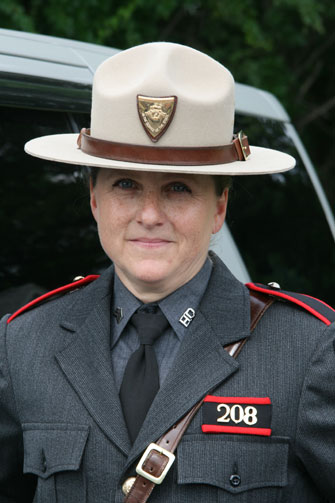How do we build resilient girls? How do you build resiliency in your own life?

Laurie Ludovici is in her eighteenth year in law enforcement, currently serving as division accreditation manager with the Rhode Island State Police. Under her guidance the Rhode Island State Police was awarded “Accreditation with Excellence” based on the national gold standard assessment model. A combat veteran as well, she retired from the Army National Guard as a major following her tour flying UH-60 Black Hawks in Iraq. Ludovici was the first female candidate from Rhode Island to attend and graduate from the U. S. Army’s flight training program. She is a graduate of Roger Williams University. Ludovici was recently selected for a three-year appointment as the sole law enforcement representative to the National Child Safety Board.
photo by Agapao Productions
We can help young girls build critical resiliency skills by supporting them while they endure difficult life experiences and by modeling resilient behavior.
Whether the challenge is a difficult school work assignment, social conflict, or other pressures, each challenge confronted and brought to resolution builds upon the previous one, providing valuable experience and empowering young girls to keep trying.
Although failure may be feared, girls can learn that failure is only a curve in the road, not the end of the road. Young girls need to be engaged in positive and purposeful interactions with their families and in their schools and communities. Using this engagement and ongoing interactions as a replacement for idle time provides a sense of belonging and accomplishment while building self-esteem.
As I reflect on my years as a parent, being available and being consistent have been useful approaches. I have heard the words “I can’t” come out of my children’s mouths more than I would like. I wish I could tell you that I have some magical, perfectly choreographed response, but I don’t. I strive, and we all should strive, to support and encourage all children to push forward and do the thing they think they can’t do.
As a young girl, I used difficult experiences and role models to form an early foundation of resiliency skills. I can recall as a young school girl being terrified to get on the school bus. I would become upset; throw tantrums even, to try to get my mother to let me stay home. She pushed me onto the bus and sometimes through the school doors, forcing me to do the thing I thought I couldn’t do. She believed I could get on that bus; I began to believe it too. My mother’s support and encouragement during those times is where I began to develop resiliency.
At different stages in my life I have had to work through difficult or trying circumstances. Early in my career, as the first female candidate from the Rhode Island Army National Guard, I went off to Army flight training. I had my reservations and feared returning home as a failure. I learned that fear was not a sign of weakness. Quitting was never an option. Believing in myself and leveraging the experience of others helped me work harder and push myself to exceed my expectations.
Being selected to the State Police recruit training academy was a time of both excitement and anxiety. I had no idea what was in store for me. I relied on my experience in the military to prepare as best I could. I found that breaking this long, intense five month overnight training down into days, that turned into weeks, kept me on track and saw me to successful completion. Quitting was never an option.
The biggest challenge, both personally and professionally, came when I learned my National Guard unit was being deployed to Iraq in support of Operation Iraqi Freedom. Despite the fact that I had a fairly new husband and two young children at home, not going with my unit was never an option. During this long deployment, I found the unwavering support and encouragement of my family, friends and fellow deployed soldiers allowed me to focus on the mission. Looking back, I relied on the building blocks of resiliency that I had started to form as a young girl.
Recently, after being diagnosed with breast cancer, I looked to the countless women who had fought the battle for encouragement. I needed to see how others endured to believe that I could. I told a fellow survivor, and friend, that I hoped I could get through treatment with only half the grace and dignity she showed. I know she would laugh if I told her she was a role model.
Circumstances and challenges are unique, but what builds resilience often looks the same. My daughter may never serve overseas in combat, have a career in law enforcement, or endure a cancer diagnosis, but it is my hope that she was watching when I did. I assembled those building blocks that my mother helped form years ago. She helped me form high expectations for myself and helped show me that I could meet those expectations. And while at times my resiliency may have wavered, the foundation endured.

